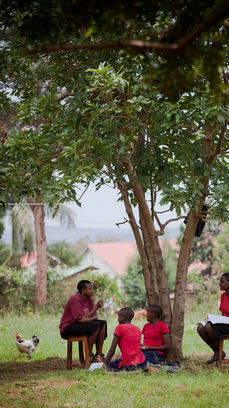Monitoring and evaluation researchers at the Notre Dame Initiative for Global Development (NDIGD) recently assisted the Ford Family Program in Human Development Studies and Solidarity, a program of the Kellogg Institute for International Studies, to do a baseline evaluation in order to determine the effectiveness off their mobile health project in Uganda. The project is supported by an $85,000 grant from the Verizon Foundation.

The Ford mobile health project provides improved information and communication technology to the village health team in Uganda’s Nnindye Parish, where the Ford Program has been engaged in community-led development work since 2008.
The project equips the local health center with cell phone-messaging software and low-power computers, making it an effective hub for monitoring community health. Health team members receive training in mobile literacy—including texting—and then pass on their new skills to hundreds of other Nnindye residents.
Recently, NDIGD Monitoring and Evaluation Specialist, Juan Carlos Guzman, travelled to Uganda to conduct the baseline survey for the project. The survey will ensure that project activities are evaluated through comparison of pre-and post-test questionnaires and that health-seeking behavior is tracked through statistics kept at the village health center. The evaluation will test whether text messages increase health seeking behavior under a randomized control trial method. Comparable data has also been collected from similar communities to ascertain the impact attributable to the project’s activities.
The evaluation research team includes the Ford Program Research Director William N. Evans and recent Notre Dame PhD and current Assistant Professor at DePaul University, Luke Chicione. The latter supported the implementation of the baseline survey.
The survey team has collected information from 1,212 households, 5,657 individuals, and 1,161 children who are five years-old or younger. They collected information on text messaging (SMS) usage for those who have a cellphone.
The survey found that 1,800 individuals reported being ill in the last month, and 83.5 percent consulted someone regarding the illness.
Of those who did seek medical care, only 32 percent visited the Nnindye Health Center (NHC), another 30 percent went to a nearby hospital, and five percent consulted the community healthcare distributor.
Most of the illnesses (70%) lasted 7 days or less. For these minor illnesses only 29 percent visited NHC. Interestingly, 70 to 75 percent of the sample report having their children vaccinated, compared to vaccination coverage of approximately 95% as reported by NHC.
“NDIGD specializes in performing monitoring and evaluation to determine the impact for global development projects,” says NDIGD Managing Director, Michael Sweikar. “At NDIGD, Notre Dame faculty and staff work with global development practitioners to measure and evaluate the effectiveness that programs have on communities in developing countries.”
The mobile health project is overseen by Ford Program Director Rev. Robert Dowd, CSC and Tom Marentette of the Office of Information Technology is working with the team to provide the new technology to the village health teams. He will be traveling to Uganda in mid-January to install the required systems and train the initial users.The data collected by the research team will enable the Ford Program to understand the impact of the updated technology and health outcomes when health center workers are able to start sending messages—to remind women of prenatal or well-baby appointments or to spread the word when supplies such as anti-malarial bed nets or vaccines become available.
Contact: Michael Sweikar, NDIGD Managing Director msweikar@nd.edu